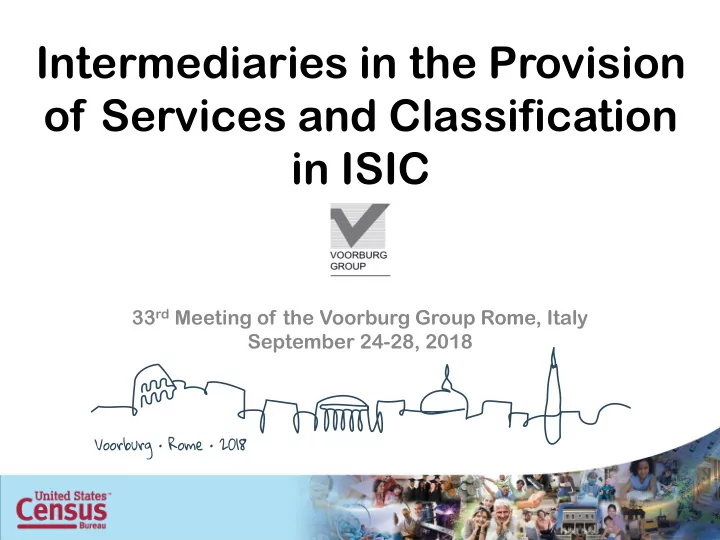

Intermediaries in the Provision of Services and Classification in ISIC 33 rd Meeting of the Voorburg Group Rome, Italy September 24-28, 2018
Retai etail l Trade ade • the resale (sale without transformation) of new and use sed goods ds mainly to the general public for personal or household consumption or utilization, by shops, department stores, stalls, mail-order houses, hawkers and peddlers, consumer cooperatives, etc.” • include certain agency services in retail trade such as retail commission agents and retail auctioning houses International Standard Industrial Classification of All Economic Activities (ISIC), Revision 4, Statistical Papers Series M, No.4/Rev.4, United Nations, 2008, page 188 2
Ser ervices vices Services are the result of a production activity that changes the • conditions of the consuming units, or facilitates the exchange of products or financial assets. Change-effecting services are outputs produced to order and • typically consist of changes in the conditions of the consuming units realized by the activities of producers at the demand of the consumers. Change-effecting services are not separate entities over which • ownership rights can be established. They cannot be held in inventories by the producer or traded separately from their production. * Arrangement and payment can be temporally separated • * System of National Accounts, 2008, United Nations, ST/ESA/STAT/SER.F/2/Rev.5, 2009, paragraph 6.19 3
Se Services vices Transactions ansactions • For a service transaction to occur, there must be a consumer and a producer who willingly interact to implement and receive the change • The service is the change itself rather that some intangible good • Because the service is a change, it cannot be inventoried and is not conceptually the same as a good • Transactions for services occur regularly, and aspects of the entire process can be separated out to specialist providers even if the service cannot be traded separately from the production. 4
Terminology Retailing services Inventory risk Merchanting Outsourcing part of the production process 5
Outs tsour ourcing cing • Service provider is outsourcing aspects of the transaction such as outreach, payment processing, reservation services, etc. • Not providing the actual service (in most cases) • Exception is capacity risk 6
IS ISIC IC Outs tsour ourcing cing Guid idance ance • Principals that outsource part of the production process are classified in the industry of the complete process. • Contractors are classified to the industry of units producing the same services on their own account. 7
ISIC IC Structur ucture ISIC includes separate classes for outsourced activities in • services transactions that were significant and fairly homogeneous. – Examples: travel agency services, real estate agency services, stock brokerage services, and reservation services. The selling of a service on a commission or fee basis is • classified to the industry of the service being sold if there is not a separate class in ISIC. – Examples: selling lottery tickets on a commission basis is classified with gambling activities and selling transit passes on a commission basis is classified with transit services. 8
20 2013 13 gu guid idance ance - is there a clear predominance of one single service • being “sold”? - is there a mixture of goods and services (or intellectual • property products) being “sold”? - is the unit engaged in processing the payments for the • goods or services “sold”? - is the unit actively engaged in delivering the product to • the user (in whatever suitable)? - is the unit actively engaged in marketing/advertising the • product? • - is the unit receiving payments from customers or sellers of the product, i.e. to whom is the “sales” service provided? 9
Exp xper ert t Group oup Guidance idance • Does the unit in question perform the actual service? For example, are they providing the actual accommodation, equipment being rented, or change in the condition of the object of the service? If so, classify to the activity as described in ISIC and measure the gross amount received for the provision of the service. Does the unit subcontract the actual service but assume or accept “capacity • risk” or transactional risk for the provision of the service? For example a provider that subcontracts the accommodation services to a hotel but pays for the night even if the room is open. If yes, classify to the activity of the capacity or transactional risk and measure the net amount received for the provision of the service. • Does the unit only provide intermediary or agency services in the transaction (e.g., a booking service that provides reservation services to hotels but has no capacity risk and operates on a commission or fee basis)? If yes, classify to the ISIC class of the activity being performed – if there is a separate class in ISIC for the agency service or default to the ISIC class of the change producing service if there is not a separate class and measure on a commission or fee basis. 10
Practical actical exa xamples mples Ride sharing service – platform is a taxi dispatch service, • individual drivers are taxi service Home sharing services – platform bringing together • providers and consumers is reservation service, property owners are providing accommodation services Can be hard to identify primary activity - deal of the day • sites • Third party sales on large retail trade platforms – often own account selling by platform but also logistics/payment/other services provided to third parties. Product and measurement. Basic guidance applies – what is the unit actually doing? • Look for capacity risk – who bears that risk? • 11
Questio estions? ns? • Expert Group on International Classifications has taken over UNSD classification work • Eurostat classifications taskforce • Others – Canada, Mexico, US for NAICS 12
Recommend
More recommend